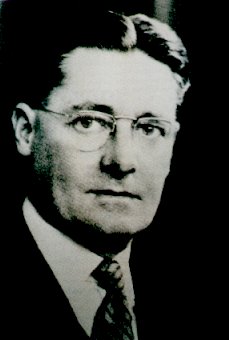Florey and Penicillin
Today, a parable about awards. The University of Houston's College of Engineering presents this series about the machines that make our civilization run, and the people whose ingenuity created them.
Biochemist Mary Krinsky writes to tell me a story about penicillin. She raises a favorite theme of mine: scientific priority is a bankrupt notion, since science deals with a universe that was there long before we came out the cave. And so, of course, was penicillin. After all, it does exist in nature.
So to make a case for priority we run a gamut of questions. Who was first aware of its existence? Who first saw its healing powers? Who first isolated it? Who first produced it? Who first synthesized it? You extend the list. I grow tired.
Pasteur recognized that antibacterial agents might exist. An American named Porter saw penicillin acting against microorganisms in 1924. In 1929, Alexander Fleming looked at penicillin as a possible antiseptic. But he couldn't purify it without destroying its potency. And there the matter lay until the 1930s.
Then the young pathologist Howard Florey took an interest in Fleming's work and began studying antibacterial agents. Antiseptics simply attack all the germs in an area. Florey realized we might create substances that could enter our system and wipe out a single strain of bacteria.
In 1935, Oxford University gave Florey the job of revitalizing its pathology department. Florey formed a remarkable group of young men and women. By 1940 they'd figured out how to isolate stable penicillin from mold. WW-II was now in full swing, and Florey tried to interest the English and American War Departments in producing the drug. He had no luck. But then, a key event:
A friend of Fleming's fell ill. He went to Florey for penicillin. Florey generously handed him the world's entire supply of the stuff. It saved Fleming's friend. Then Fleming called in reporters, and the cameras all turned on him, not on Florey.
After that, Florey's group got just enough funding to go ahead. A single dose of penicillin came from thousands of liters of solution. How the group designed that production is a great bootstrap, make-do, story of the War. In 1944, Allied troops carried penicillin with them onto the beaches of Normandy.
A year later, Florey, Fleming, and E.B. Chain from Florey's group won the Nobel Prize. And we're left wondering: if a perfect prize were to be given, who would it honor? Would it go to one exemplar of this great train of creativity? Would it go to a line of people all the way back to Pasteur or even Hippocrates?
Honors do help us to focus on virtue and excellence. But not as well as history does. And history shows, over and over, that creativity is a communal act, not an individual one. It is a sad thing to see this grand tapestry of human invention reduced to just a few names -- on a Nobel Prize.
I'm John Lienhard at the University of Houston, where we're interested in the way inventive minds work.
(Theme music)
I am grateful to Dr. Mary Krinsky of St. Onge Steward Johnston & Reens, Stamford, Connecticut, for her well-documented discussions delivered on e-mail and by regular mail. See also entries for both Florey and Fleming in the Dictionary of Scientific Biography (C.C. Gilespie, ed.). Chas. Scribner's Sons, 1970-1980.
For more on penicillin, see Episode 601.

Howard Florey
(Photo courtesy of Mary Krinsky)